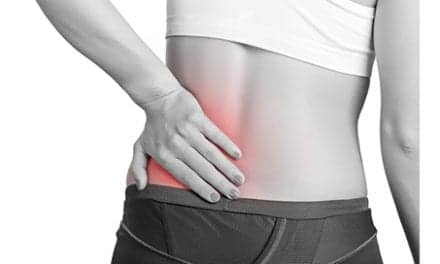According to recent research, neither an NSAID by itself, or combined with a muscle relaxant or with an opioid, helped improve low back pain (LBP) in patients presenting to an emergency department.
The study, which appears in a recent issue of JAMA, compared the nonsteroidal anti-inflammatory drug (NSAID) naproxen combined with oxycodone/acetaminophen, the muscle relaxant cyclobenzaprine, or a placebo, per a release from The JAMA Network Journals.
In the study, Benjamin W. Friedman, MD. MS, of the Montefiore Medical Center, Albert Einstein College of Medicine, Bronx, NY, and colleagues randomly assigned 323 patients who presented to an emergency department with nontraumatic, nonradicular LBP of 2 weeks’ duration or less to receive a 10-day course of naproxen + placebo (n = 107); naproxen + cyclobenzaprine (5 mg) (n = 108); or naproxen + oxycodone, 5 mg/acetaminophen, 325 mg (n = 108).
Participants were instructed to take one or two of these tablets every 8 hours, as needed for LBP; naproxen, 500 mg, was to be taken twice a day. Patients also received a standardized 10-minute LBP educational session prior to discharge, the release explains.
The researchers found that neither the muscle relaxant or opioid combination provided any better pain relief or improvement in functional outcomes than the placebo combination. Measures of pain, functional impairment, and use of healthcare resources were not different among the study groups at 7 days or 3 months after the emergency department visit, per the release.
Regardless of allocation, nearly two-thirds of the study participants demonstrated clinically significant improvement in LBP and function 1 week later. However, 40% of the participant group reported moderate or severe pain, half reported functionally impairing LBP, and nearly 60% were still using medication for their LBP 1 week later.
By the 3-month follow-up, nearly one-fourth of the participants reported moderate or severe pain and use of medications for LBP. Three months after the emergency department visit, regardless of study group, opioid use for LBP was uncommon, with fewer than 3% of patients reporting use of an opioid within the previous 72 hours, the release explains.
“These findings do not support the use of these additional medications in this setting,” the study authors write.
[Source(s): The JAMA Network Journals, EurekAlert]





